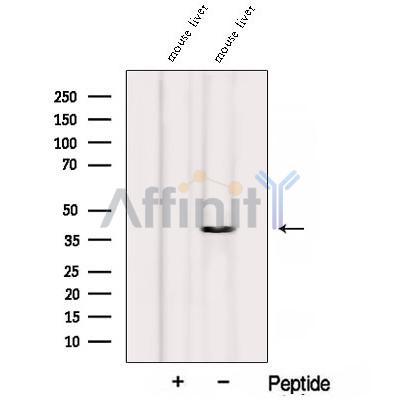ADH1B Antibody - #DF12809
| Product: | ADH1B Antibody |
| Catalog: | DF12809 |
| Description: | Rabbit polyclonal antibody to ADH1B |
| Application: | WB IHC IF/ICC |
| Reactivity: | Human, Mouse, Rat |
| Mol.Wt.: | 40 kDa; 40kD(Calculated). |
| Uniprot: | P00325 |
| RRID: | AB_2845770 |
Related Downloads
Protocols
Product Info
*The optimal dilutions should be determined by the end user. For optimal experimental results, antibody reuse is not recommended.
*Tips:
WB: For western blot detection of denatured protein samples. IHC: For immunohistochemical detection of paraffin sections (IHC-p) or frozen sections (IHC-f) of tissue samples. IF/ICC: For immunofluorescence detection of cell samples. ELISA(peptide): For ELISA detection of antigenic peptide.
Cite Format: Affinity Biosciences Cat# DF12809, RRID:AB_2845770.
Fold/Unfold
ADH beta subunit; ADH1B; ADH1B_HUMAN; ADH2; Alcohol dehydrogenase 1B; alcohol dehydrogenase 2 (class I), beta polypeptide; Alcohol dehydrogenase 2; Alcohol dehydrogenase subunit beta; Aldehyde reductase; DKFZp686C06125; OTTHUMP00000220192;
Immunogens
A synthesized peptide derived from human ADH1B, corresponding to a region within the internal amino acids.
- P00325 ADH1B_HUMAN:
- Protein BLAST With
- NCBI/
- ExPASy/
- Uniprot
MSTAGKVIKCKAAVLWEVKKPFSIEDVEVAPPKAYEVRIKMVAVGICRTDDHVVSGNLVTPLPVILGHEAAGIVESVGEGVTTVKPGDKVIPLFTPQCGKCRVCKNPESNYCLKNDLGNPRGTLQDGTRRFTCRGKPIHHFLGTSTFSQYTVVDENAVAKIDAASPLEKVCLIGCGFSTGYGSAVNVAKVTPGSTCAVFGLGGVGLSAVMGCKAAGAARIIAVDINKDKFAKAKELGATECINPQDYKKPIQEVLKEMTDGGVDFSFEVIGRLDTMMASLLCCHEACGTSVIVGVPPASQNLSINPMLLLTGRTWKGAVYGGFKSKEGIPKLVADFMAKKFSLDALITHVLPFEKINEGFDLLHSGKSIRTVLTF
Research Backgrounds
Catalyzes the NAD-dependent oxidation of all-trans-retinol and its derivatives such as all-trans-4-hydroxyretinol and may participate to retinoid metabolism. In vitro can also catalyzes the NADH-dependent reduction of all-trans-retinal and its derivatives such as all-trans-4-oxoretinal. Catalyzes in the oxidative direction with higher efficiency. Has the same affinity for all-trans-4-hydroxyretinol and all-trans-4-oxoretinal.
Cytoplasm.
Belongs to the zinc-containing alcohol dehydrogenase family.
Research Fields
· Human Diseases > Cancers: Overview > Chemical carcinogenesis.
· Metabolism > Carbohydrate metabolism > Glycolysis / Gluconeogenesis.
· Metabolism > Lipid metabolism > Fatty acid degradation.
· Metabolism > Amino acid metabolism > Tyrosine metabolism.
· Metabolism > Metabolism of cofactors and vitamins > Retinol metabolism.
· Metabolism > Xenobiotics biodegradation and metabolism > Metabolism of xenobiotics by cytochrome P450.
· Metabolism > Xenobiotics biodegradation and metabolism > Drug metabolism - cytochrome P450.
· Metabolism > Global and overview maps > Metabolic pathways.
References
Restrictive clause
Affinity Biosciences tests all products strictly. Citations are provided as a resource for additional applications that have not been validated by Affinity Biosciences. Please choose the appropriate format for each application and consult Materials and Methods sections for additional details about the use of any product in these publications.
For Research Use Only.
Not for use in diagnostic or therapeutic procedures. Not for resale. Not for distribution without written consent. Affinity Biosciences will not be held responsible for patent infringement or other violations that may occur with the use of our products. Affinity Biosciences, Affinity Biosciences Logo and all other trademarks are the property of Affinity Biosciences LTD.


